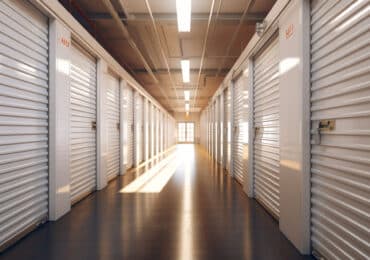Relocating your extra possessions to a self-storage unit can be a welcome relief, freeing up space in your home from the clutter of boxes and furniture. However, the convenience of self-storage is not without its risks. Your treasured items, from grandma’s china to your child’s baby photos, are susceptible to potential damage from pests, leaks, theft, and more.
Customers encounter issues such as damage and disappearance of items each year, transforming storage convenience into a source of headaches and heartache. While homeowners often insure their homes, they may overlook the perils of placing items in warehouses.

The encouraging news is that you can mitigate these problems by making informed choices when selecting a reputable company, adopting careful packing practices, and implementing safety precautions. With this, you can store your extra personal items with confidence.
This guide provides practical tips to ensure your peace of mind. By following these suggestions, you can conveniently access items that don’t fit at home without worrying about their safety. Once you’ve decided, you may secure storage units Brandon Drive Tyler or at a reputable facility near you.
Understanding The Risks
When utilizing self-storage, it’s crucial to be aware of several vital dangers:
- Theft – While facilities implement safety measures such as perimeter fencing and cameras, they generally have less security than banks or homes. Determined criminals may break in, and there’s also the risk of insider stealing if dishonest employees have entry.
- Pests and leaks – Climate control can help prevent issues, but any facility is susceptible to water leaks, rodents, or moth infestations without routine maintenance. In the absence of climate control, changes in humidity and temperature can accelerate deterioration. Even in secured units, paper goods may develop mold, wooden furniture could warp or crack, and fabric and photos may easily mildew.
- Improper packing – Stacked boxes risk tumbling over, while loosely packed fragile items can break. Moving swiftly in a storage aisle can result in corners banging and glass shattering. With proper organization, mixed-up unit numbers may make it easier to locate your possessions later.
Theft, pests, adverse weather conditions, and improper packing all present distinct dangers to your cherished items. However, armed with knowledge about these pitfalls, you can better protect your valuables by making informed choices regarding your unit, employing careful packing techniques, and implementing additional critical measures. Being forewarned is being forearmed when it comes to safeguarding your particular belongings.
Choosing The Right Facility
The primary and crucial step in ensuring the safety of your personal belongings, especially if you’re a student with a collection of precious books or an avid collector, is selecting the right company. Start by pinpointing well-reviewed facilities conveniently located with the amenities you need. Utilize reputable online platforms to compare options, reviews, and prices in your locality.
During facility tours, prioritize those equipped with essential safety features such as secured perimeter gates, individual unit alarms, video surveillance, and the presence of on-site managers. Clean and well-lit properties, coupled with regular pest control, indicate responsible maintenance. Pay attention to staff interactions; good customer service reflects a commitment to proper procedures.
Take into account your climate needs when choosing a facility. Assess whether standard, temperature-controlled, or humidity-controlled spaces are necessary. Climate-stabilized units protect against issues like mold, pests, and structural cracks. Fire protection is essential, so ensure the facility has integrated sprinkler systems or firewalls between units. Additionally, 24/7 access is a crucial consideration to accommodate your schedule.
Thoroughly vet the facility before entrusting it with your cherished possessions. Investing an extra hour touring the site beforehand can prevent significant issues in the future. Choose an operation that prioritizes the soundness of items and exemplary customer service.
Packing For Safety
Efficiently packing your items plays a crucial role in minimizing damage. First, opt for high-quality cardboard boxes appropriate for the intended storage duration. For longer-term safekeeping, prioritize acid-free, lignin-free boxes to prevent deterioration over time. Ensure the chosen boxes are new and rated for 50+ lbs to avoid collapses.
Use bubble wrap to protect delicate items, which should be loosely packed in boxes alongside packing peanuts, paper, or towels to prevent any shifting during the deposit period. Clearly label the contents of each box on all sides to facilitate easy retrieval later on, keeping the weight under 50 lbs for manageable handling. Maintain balance by placing heavier items below lighter ones and consider disassembling bulky furniture to optimize space.
Generate an itemized list detailing the contents of each box for insurance purposes in the event of loss or damage. Avoid overpacking to mitigate the risk of crushing, and individually wrap fragile items such as picture frames and mirrors before placing them in boxes. Utilize wardrobe boxes for hanging clothes and securely seal all boxes with high-quality tape.
Common-sense packing practices, such as using quality boxes, padding fragile items, and thorough labelling, safeguard your precious items.
Securing Your Unit
Ensuring the security of your unit starts with selecting a high-quality lock. Choose from robust options like well-made padlocks, combination locks, or disc locks, providing maximum resistance to picking. For added security, consider implementing smart locks with advanced features and technology. Avoid depending on flimsy factory-issued locks, as they may be susceptible to breaches using tools. Additionally, steer clear of key locks, as others can duplicate them without your knowledge.
Share facility access information and keys only with individuals you trust, such as a spouse or relative. Avoid openly distributing keys or codes to friends or movers who may replicate them. Familiarize yourself with facility operating hours and procedures to control who enters and when.
Another prudent step is maintaining an offsite inventory list of boxed items in case of robbery. Digital files or copies stored with a friend, in your home safe, or the cloud ensure you have a detailed record of your goods if items go missing from your unit.

Additional Precautions For Extra Peace Of Mind
Even with a secure facility and meticulous packing, incorporating extra measures can significantly contribute to your assurance. One wise step is acquiring rental insurance to safeguard your personal effects during a disaster. While many home insurance policies exclude coverage, specialized storage insurance is an affordable option that protects against pilfering, water damage, and more.
Furthermore, photographing items before storing them serves as crucial proof of ownership in case it becomes necessary later. These pictures capture unique markings, model numbers, or distinguishing features that differentiate items from similar ones.
Lastly, resist the temptation to stash goods away indefinitely without periodic checks. Aim to enter the unit 1-2 times a year. During these visits, scan for signs of damage, such as leaks or pest intrusions, and ensure items are securely stored. Promptly notify the facility of any concerns so that they can address issues timely.
While added insurance, documentation, and periodic inspections may require some extra effort, they provide crucial protection for potential claims and help identify flaws that may need attention from staff.
Final Thoughts
Using self-storage for extra belongings seems straightforward until challenges arise. In these anonymous spaces, your valued possessions face threats like theft, pests, weather, and mishandling. However, you can confidently store items with smart facility selection, secure packing practices, vigilant safeguards, and added insurance. Invest time upfront to understand pitfalls, find a reputable company aligned with security priorities, pack carefully, lock securely, and check periodically. With informed and proactive measures, accessing stored items becomes worry-free. Convenience need not compromise caution in preserving cherished memories and personal items.

